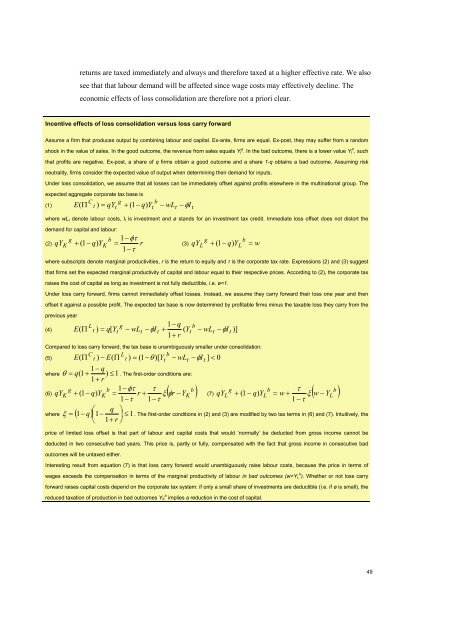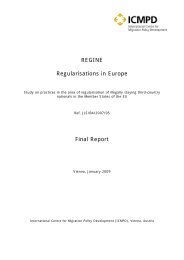The economic effects of EU-reforms in corporate income tax systems
The economic effects of EU-reforms in corporate income tax systems
The economic effects of EU-reforms in corporate income tax systems
You also want an ePaper? Increase the reach of your titles
YUMPU automatically turns print PDFs into web optimized ePapers that Google loves.
eturns are <strong>tax</strong>ed immediately and always and therefore <strong>tax</strong>ed at a higher effective rate. We also<br />
see that that labour demand will be affected s<strong>in</strong>ce wage costs may effectively decl<strong>in</strong>e. <strong>The</strong><br />
<strong>economic</strong> <strong>effects</strong> <strong>of</strong> loss consolidation are therefore not a priori clear.<br />
Incentive <strong>effects</strong> <strong>of</strong> loss consolidation versus loss carry forward<br />
Assume a firm that produces output by comb<strong>in</strong><strong>in</strong>g labour and capital. Ex-ante, firms are equal. Ex-post, they may suffer from a random<br />
shock <strong>in</strong> the value <strong>of</strong> sales. In the good outcome, the revenue from sales equals Y g t . In the bad outcome, there is a lower value Y b t , such<br />
that pr<strong>of</strong>its are negative. Ex-post, a share <strong>of</strong> q firms obta<strong>in</strong> a good outcome and a share 1-q obta<strong>in</strong>s a bad outcome. Assum<strong>in</strong>g risk<br />
neutrality, firms consider the expected value <strong>of</strong> output when determ<strong>in</strong><strong>in</strong>g their demand for <strong>in</strong>puts.<br />
Under loss consolidation, we assume that all losses can be immediately <strong>of</strong>fset aga<strong>in</strong>st pr<strong>of</strong>its elsewhere <strong>in</strong> the mult<strong>in</strong>ational group. <strong>The</strong><br />
expected aggregate <strong>corporate</strong> <strong>tax</strong> base is<br />
C g<br />
b<br />
(1) E(<br />
Π t ) = qYt<br />
+ (1 − q)<br />
Yt<br />
− wLt<br />
−φI<br />
t<br />
where wL t denote labour costs, I t is <strong>in</strong>vestment and ø stands for an <strong>in</strong>vestment <strong>tax</strong> credit. Immediate loss <strong>of</strong>fset does not distort the<br />
demand for capital and labour:<br />
1−φτ<br />
g<br />
b<br />
( (3) qYL + ( 1−<br />
q)<br />
YL<br />
= w<br />
1−τ<br />
g<br />
b<br />
(2) qYK<br />
+ 1−<br />
q)<br />
YK<br />
= r<br />
where subscripts denote marg<strong>in</strong>al productivities, r is the return to equity and τ is the <strong>corporate</strong> <strong>tax</strong> rate. Expressions (2) and (3) suggest<br />
that firms set the expected marg<strong>in</strong>al productivity <strong>of</strong> capital and labour equal to their respective prices. Accord<strong>in</strong>g to (2), the <strong>corporate</strong> <strong>tax</strong><br />
raises the cost <strong>of</strong> capital as long as <strong>in</strong>vestment is not fully deductible, i.e. øY b L ). Whether or not loss carry<br />
forward raises capital costs depend on the <strong>corporate</strong> <strong>tax</strong> system: if only a small share <strong>of</strong> <strong>in</strong>vestments are deductible (i.e. if ø is small), the<br />
reduced <strong>tax</strong>ation <strong>of</strong> production <strong>in</strong> bad outcomes Y b K implies a reduction <strong>in</strong> the cost <strong>of</strong> capital.<br />
L<br />
49
















